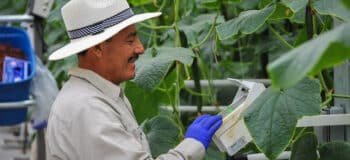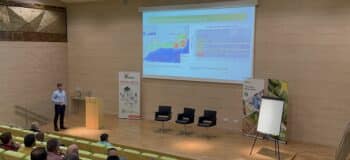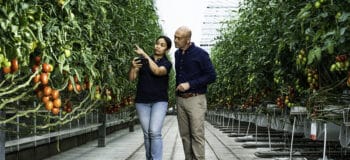9 May 2022
Algorithms beat traditional tomato growing methods

After more than eight months of competition, on April 25, the final summit of the second “PINduoduo Smart Agriculture Competition” was held online, and the tomatoes grown by the “Toma Grow” team won the championship with yields and quality that far exceeded those achieved with traditional farming methods.
The Toma Grow team is composed of young “new farmers” from Wageningen University, China Agricultural University, Northwest Agriculture and Forestry University, Polaris Agriculture and Bayer CropScience, used a “human-machine fusion intelligence” algorithm strategy to convert advanced planting practices into algorithms that helped growers cultivate tomatoes that were far superior to traditionally grown crops.
The second “PINduoduo Smart Agriculture Competition” was jointly organized by Pinduoduo, China Agricultural University and Zhejiang University, with technical guidance from the Food and Agriculture Organization of the United Nations and Wageningen University.
Similar to the first edition of “Growing Strawberries with Technology”, this year’s competition is entitled “Growing Tomatoes with Technology”, with the goal of “growing more and growing better”, while focusing on environmental sustainability and commercial viability. The competition attracted more than 120 researchers from 15 teams worldwide. Four teams, ranging from academic researchers with university backgrounds to commercial growers, made it to the final round.

In September 2021, the finalists grew tomatoes in Beijing, Shanghai, Zhejiang and the Netherlands by remotely controlling smart greenhouses at the competition site in Kunming, Yunnan, through software that combined precision agriculture techniques such as nutrition, computer vision and deep learning. “During this time, although we could not see these crops every day, the human-machine fusion algorithm helped us in real time and constantly revised the planting strategy. This also validates the future business value of the algorithm, which is to help growers improve efficiency, reduce error rates and break the limits of time and space.” said Mr. Dan Xu, captain of the winning team, TomaGrow.
In addition to TomaGrow, three other teams also performed well. The “CyberTomato” team, led by China Agricultural University, won the Excellence Award, while the “Horti-AI” team, with its diverse research background, and the “Hamato” team, composed of young scholars from Zhejiang University, won the Excellent Award. The judging showed that the four finalist teams’ tomatoes produced on average about twice the yield compared to traditional cultivation and met industry standards for high nutritional quality.
“Our global agri-food system needs innovative and sustainable solutions,” said Carlos Watson, FAO Representative in China, at the summit, “and the PINduoduo Smart Agriculture Competition provides an innovative platform to attract young scholars, technologists, entrepreneurs, research institutions and technology companies to work together to create practical solutions to smallholder farmers’ real-world problems in response to specific needs.”
It was the second time that Ridder supported the PINduoduo competition. Find out why Ridder has been supporting some of the world’s most promising agri-tech research teams taking on the challenge of growing tomatoes with AI technology, here.





